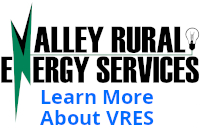Touchstone Energy | Truck from Ruben Musca on Vimeo.
 Valley Rural Electric Cooperative is a not-for-profit cooperative owned by the members it serves.
Valley Rural Electric Cooperative is a not-for-profit cooperative owned by the members it serves.
What does that mean?
It means you are an owner. And your vote and participation at district nominating meetings and the Annual Meeting determine the directors and policies of the cooperative. You could run for director, too.
It means your utility is offering electric service at the lowest possible cost. Cooperatives like Valley REC are not-for-profit. Any revenue left over after expenses are paid is allocated to the members as capital credits and returned as financial conditions permit. (Please see Capital Credits.)
It means you have a real voice in the operation of your electric utility. Use that voice and be a part of the democratic process. Call the Member Services Department for information on how to get involved.
The Electric Cooperative Story
Cooperative Principles
Cooperatives like Valley REC use seven basic principles as a guide for doing business. This set of guidelines can be stated many ways. The Pennsylvania Rural Electric Association describes the principles in the following manner.
- Voluntary And Open Membership - Membership in a cooperative is available to all who can reasonably use its services, regardless of race, religion, sex, or economic circumstances.
- Democratic Member Control - Cooperatives are democratically controlled, with each member having one vote. As a result, control remains in the hands of all customers. Directors are elected from among the membership.
- Member Economic Participation - Cooperatives provide services "at cost" and remain not-for-profit regardless of the value of benefits delivered. Any money left over after all expenses are paid - margins - belongs to the members. Each member's share in the margins is determined by the amount of his or her patronage, or use, of the cooperative’s services.
- Autonomy And Independence - Cooperatives are self-sustaining, self-help organizations controlled by their members. If cooperatives enter into agreements with others or raise money from outside sources, they do so on terms that maintain democratic control as well as their unique identity.
- Continuing Education - Education and training for members, directors, managers, and employees are prioritized so they can effectively govern the cooperative. Communication, particularly with young members and opinion leaders, helps generate necessary public support for cooperatives.
- Cooperation Among Cooperatives - Mutual support helps cooperatives improve services, bolster local economies, and deal more effectively with social and community needs.
- Concern For Community - Cooperatives develop communities through programs supported by the membership.
The Electric Cooperative Purpose
Want to learn more?
To learn more about cooperatives, read The Cooperative Story on the Pennsylvania Rural Electric Association website. This site will open in a new browser window or tab.


 Valley Rural Electric Cooperative is a not-for-profit cooperative owned by the members it serves.
Valley Rural Electric Cooperative is a not-for-profit cooperative owned by the members it serves.